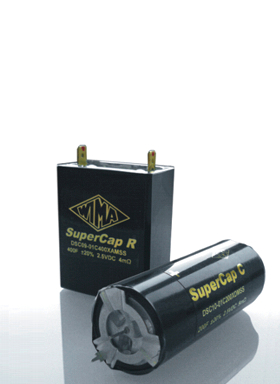
SuperCapacitorsThe Double Layer Capacitors developed by WIMA are storage capacitors with highest capacitance values in the Farad range. They are among others suited to serve as batteries, can deliver considerably higher currents for a short time, however, and are maintenance free.
The construction of a Double Layer Capacitor can be described as a plate capacitor where the most important topic is to obtain electrodes with an extremely large surface. For this purpose activated carbon is ideally suited, as it allows to obtain capacitance values of up to 100F/g of the active mass of the electrode.
The electrolyte, the conductive liquid between the electrodes, is a conducting salt dissolved in an aqueous or organic solvent which permits to apply voltages of 2 V (in special cases 3 V).
The actual double layer consists from ions which attach to the electrodes - negative ions to the positive electrode and positive ions to the negative electrode - as soon as a voltage is applied to the cell and thus create a dielectric of a few Angstrom only. According to the formula for the capacitor from the dielectric constant of the double layer (approx. 10) and the extremely thin dielectric you get an very high capacitance value.
| |
SuperCap |
| single cells with cylindrical metal case |
single cells with cylindrical metal case, Ø=60mm |
series connected modules, passively or actively balanced |
series connected modules, passively or actively balanced |
series connected modules, passively or actively balanced |
single cells with rectangular metal case |
series connected modules, passively or actively balanced |
 |
 |
 |
 |
 |
 |
 |
| Dielectric |
Electric Double Layer |
Electric Double Layer |
Electric Double Layer |
Electric Double Layer |
Electric Double Layer |
Electric Double Layer |
Electric Double Layer |
| Rated current |
30A to 1000A* |
150A to 240A* |
550A - 650A* |
400A to 650A* |
400A to 1000A* |
30A to 800A* |
50A to 800A* |
| Pulse current |
up to 5000A |
up to 2200A |
up to 2000A |
up to 2400A |
up to 5000A |
up to 3000A |
up to 3000A |
Operating temperature
range |
-30°C to +65°C |
-30°C to +65°C |
-30°C to +65°C |
-30°C to +65°C |
-30°C to +65°C |
-30°C to +65°C |
-30°C to +65°C |
| Maximal energy: at +20°C |
344 J - 18 kJ* |
5.5 kJ - 11 kJ* |
3.6 kJ - 7.5 kJ* |
11 kJ - 22 kJ* |
7.5 kJ - 330 kJ* |
113 J - 10 kJ* |
3 kJ - 70 kJ* |
Voltage range VDC
Capacitances |
2.5 |
2.7 |
5 |
14 |
28 |
14 |
28 |
56 |
112 |
2.5 |
5 |
14 |
16 |
| 12 F |
|
|
|
|
|
|
|
|
|
|
|
|
|
| 24 F |
|
|
|
|
|
|
|
|
|
|
|
|
|
| 28 F |
|
|
|
|
|
|
|
|
|
|
|
|
|
| 50 F |
|
|
|
|
|
|
|
|
|
|
|
|
|
| 55 F |
|
|
|
|
|
|
|
|
|
|
|
|
|
|
|
| 100 F |
|
|
|
|
|
|
|
|
|
|
|
|
|
|
|
| 110 F |
|
|
|
|
|
|
|
|
|
|
|
|
|
|
|
|
|
| 115 F |
|
|
|
|
|
|
|
|
|
|
|
|
|
| 200 F |
|
|
|
|
|
|
|
|
|
|
|
|
|
|
|
|
|
|
|
| 210 F |
|
|
|
|
|
|
|
|
|
|
|
|
|
| 230 F |
|
|
|
|
|
|
|
|
|
|
|
|
|
| 300 F |
|
|
|
|
|
|
|
|
|
|
|
|
|
|
|
|
|
| 400 F |
|
|
|
|
|
|
|
|
|
|
|
|
|
|
|
| 420 F |
|
|
|
|
|
|
|
|
|
|
|
|
|
| 450 F |
|
|
|
|
|
|
|
|
|
|
|
|
|
| 600 F |
|
|
|
|
|
|
|
|
|
|
|
|
|
|
|
|
|
|
|
| 840 F |
|
|
|
|
|
|
|
|
|
|
|
|
|
| 1200 F |
|
|
|
|
|
|
|
|
|
|
|
|
|
|
|
| 1500 F |
|
|
|
|
|
|
|
|
|
|
|
|
|
|
|
| 2000 F |
|
|
|
|
|
|
|
|
|
|
|
|
|
|
|
| 2700 F |
|
|
|
|
|
|
|
|
|
|
|
|
|
|
|
| 3000 F |
|
|
|
|
|
|
|
|
|
|
|
|
|
|
|
|
|
| 5000 F |
|
|
|
|
|
|
|
|
|
|
|
|
|
|
|
| 6500 F |
|
|
|
|
|
|
|
|
|
|
|
|
|
|
|
Capacitance
tolerance |
±20% |
±20% |
±20% |
±20% |
±20% |
±20% |
±20% |
| |
 |
 |
 |
 |
 |
 |
 |
 New values and ranges.
New values and ranges.
* Depending on capacitance value.




